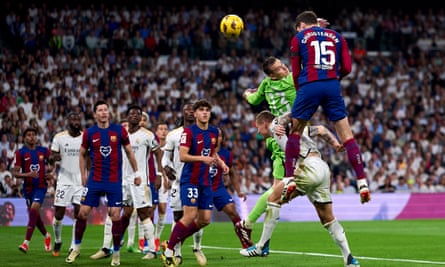The league opened with Jude Bellingham and closed with him too. Way back in August, the Englishman stood before the stands at the place they call the Cathedral and spread his arms wide having scored on the first night of the rest of his life, his arrival announced; now, eight months later, he did it again, the entire Santiago Bernabéu welcomed in, all 77,981 of them, and millions more around the world. It has become a trademark, and it meant the title.
Ninety minutes were up in the biggest game on earth and it was 2-2 when Lucas Vázquez, absolutely tireless all night, delivered one last pass towards the far post, and there was Bellingham, the man to whom this season will always belong. Thundering in at the far post, he struck it first time with his left foot into the roof of the net, to send this place wild. It was his 17th league goal and it was the one that as good as secured the title. He had done it the Real Madrid way too; the more epic, the more enjoyable.
He had grown up watching these games, these kinds of nights, this league; now it was his. Bellingham had scored twice to see Madrid come back and defeat Barcelona at Montjuic in October, another one here had given them a 3-2 win that takes them 11 points clear with just six games to go. As team mates leapt into the crowd, Bellingham went to the corner and danced with Vázquez, then pulled at that badge. The Bernabéu chanted his name and then launched into song. Champions, champions, they sang, and they will be too. He had led them there; not since Alfredo di Stefano has a player dominated their debut season here quite like him, this just the latest chapter.
A clásico conditioned by what happened in Europe in midweek was theirs and with it the title. It had not always been easy, and the best player out there might well have been 16-year-old Lamine Yamal, but Bellingham had willed it, dragging his team forward even when a draw would do and rewarded with a late victory. What a week it had been; Manchester City were beaten, another European Cup within reach, and now so were Barcelona. This was so like them. Twice behind, Madrid fought back and then, when the clocks on the new giant scoreboards in this stadium had stopped, held at 90, Bellingham appeared. As if by sheer will.
It was a wonder that they could still run. Madrid carried the physical cost of their shootout victory over Manchester City, but had the euphoria of another barely believable European Cup night. Barcelona meanwhile had the emotional baggage of elimination at the hands of Paris Saint-Germain and the fallout from a painful night, at the end of which Ilkay Gündogan had appeared to call out Ronald Araujo. “We have to turn all the anger, frustration and impotence in our favour,” Xavi had said.
It would be a stretch to say they did that exactly, and ultimately they would be beaten, the pain only deepened, but the first key moment of the game was a complete break from the European script. Where Manchester City tried and failed so many times, racking up 18 corners with no reward, Barcelona succeeded at the first attempt. Much like Wednesday night, the ball was swung in hard, close to goal. This time Andriy Lunin reached for it and missed, allowing Andreas Christensen to head into an open goal. The game was just six minutes in and Barcelona had the lead. They also had the encouragement to try again: their next three corners all caused Madrid problems, every delivery a mini crisis inside the six yard box.
Not, though, that the lead lasted long, and this time there were echoes of Europe. Once again, João Cancelo was at fault, the man guilty of giving away what even he called an “infantile” a penalty in midweek allowing Lucas Vázquez to go by and into the area where Pau Cubarsí left out a leg. There was perhaps time to withdraw it and, just as importantly, time for Vázquez to see it, taking advantage to win the penalty from which Vinícius Júnior became the first player to beat Marc Andre ter Stegen in almost 600 La Liga minutes.
This was a strange game, with little that could be called control, but there were flashes. From Yamal, especially: he dashed away from Eduardo Camavinga only to be denied by Lunin, forced the corner from which Robert Lewandowski headed just over and from another corner, thought he had scored with a clever flick which Lunin scooped clear. It looked like it had gone in but no one knew: Spain has no goal-line technology and so, rather than an instant, objective decision, two minutes 36 seconds passed during which no decision could be made and ultimately no goal given. Still Yamal ran, Camavinga struggling and twice taking him down.
after newsletter promotion

At the other end, Bellingham robbed Christensen only for Vinícius and Rodrygo, sent clear, to make a mess of the opportunity just before half time. Just after it, he released Vinícius for the Brazilian to shoot over. Increasingly he was imposing himself, but it was Barcelona who needed to win more and who scored next.
Ter Stegen’s swift, long throw found João Félix, who released the other substitute, Ferran Torres, running clear. Chased by Camavinga, he got all the way to the six-yard box and smuggled the ball beyond Lunin, but also beyond the post. Yet if that chance had gone, another followed fast. Yamal’s cross bent into the six-yard box. Torres leapt in front of Lunin, who pushed out, and Fermín López finished.
Again, the lead didn’t last. Vinícius’s superb delivery across the area evaded four defenders, Cancelo the weakest link in a chain of them, and Vázquez came flying in, judging the bounce perfectly to smash home first time. Vinícius might have made it 3-2, dashing away up the left but was stopped by Ter Stegen. Unwillingly withdrawn soon after, he didn’t get another chance. Madrid, though, did. The first fell to Joselu. With Brahim Díaz bursting forward and Vázquez setting off yet again to set it up, the second to Bellingham, who else, as his season and theirs came full circle.
Source: theguardian.com


